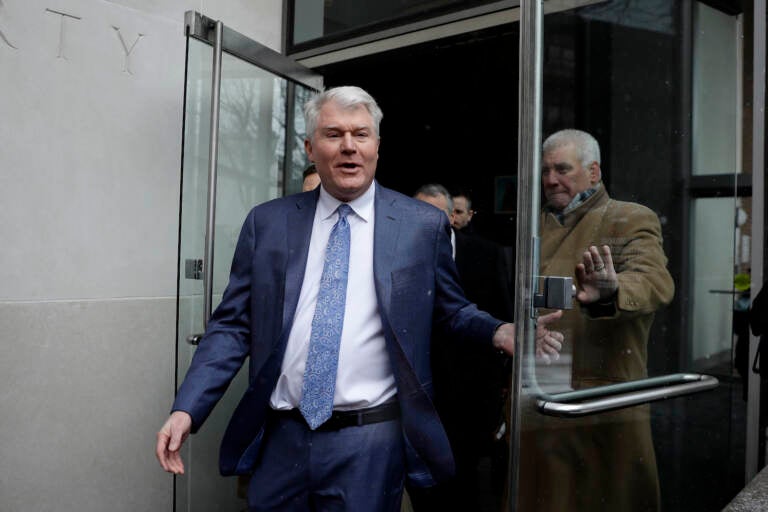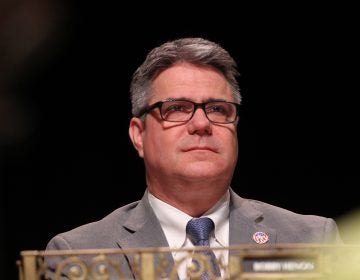Wiretaps reveal union leader sought to use Philly council member to punish company that towed his car
After a local company towed union leader Johnny “Doc” Dougherty’s car, he allegedly acted fast to get revenge. His medium: City Councilmember Bobby Henon.

File photo: John ''Johnny Doc'' Dougherty, Local 98 leader, departs the federal courthouse, Friday, Feb. 1, 2019, in Philadelphia. (AP Photo/Matt Slocum)
After a Philadelphia company towed union leader Johnny “Doc” Dougherty’s car from a South Philadelphia parking lot in September 2015, he allegedly acted fast to get revenge. His medium: City Councilmember Bobby Henon, who he allegedly directed to hold a public hearing about that specific company, George Smith Towing.
But the hearing never happened.
Government prosecutors and defense attorneys sparred Tuesday in federal court over the sequence of events that led Henon’s staff to prepare for the hearing, only to eventually drop the issue. The defense showed the jury a minute-by-minute chart of 35 minutes’ worth of calls, attempted calls, and texts between Dougherty, Henon, and others on the night in question.
“Tomorrow I am going to call Bobby Henon,” Dougherty said in a phone call with Rich Lazer, a former council staffer who soon after became deputy mayor of labor in the then-new administration of Jim Kenney. “There will be a bill in Council next week, to f*** George Smith and [towing company] Lew Blum.”
Dougherty, the head of the IBEW Local 98 union, is charged with bribing Henon to take several official actions in 2015 and 2016, including drafting legislation to hold the hearing.
In response, defense attorneys have pointed out that many residents were upset about illegal or unethical tows at the time, including Henon himself, whose own car had been towed a few months earlier. They argue that the proposed hearing was a legitimate response to those concerns.
And they repeatedly noted that despite Dougherty’s rage about being towed, as heard on wiretapped phone calls with Henon and others, the councilman never even introduced the legislation.
“Mr. Dougherty is angry,” said Henry Hockeimer, the union leader’s attorney, in a question to FBI agent Jason Blake. “He says, we’re going to hold hearings. Were there ever hearings held?”
“Not to my knowledge,” Blake responded.
“You have heard thousands of calls… Is it fair to say he’ll be focused and angry on an issue, and then just sort of move on to the next topic?” the lawyer asked.
“I’ve seen him do that in the past, yes,” the agent said.
Prosecutor Bea Witzleben nonetheless tried to back up the argument that Henon made a special effort to please Dougherty by having his staff prepare for a hearing about George Smith Towing, while not acting on complaints about other tow companies.
Tom Holroyd, a former member of Henon’s council staff, testified that he was told to draft the hearing legislation, and to cite the issue of tow companies illegally requiring car owners to pay in cash to have their car released — the same problem that had enraged Dougherty when his car was picked up.
Holroyd was also ordered to visit George Smith Towing and take a photo of a “cash only” sign. He said he did not see any such sign. He recorded video of customers being told the company’s credit card machine was broken, and being directed to withdraw cash from an ATM, but the video was of poor quality and he deleted it, he said.
Both Holroyd and Henon eventually became concerned that the hearing legislation should be modified to cover additional towing companies, according to evidence presented during the trial. Holroyd told his boss, Henon’s chief of staff Courtney Voss, that using the hearings to attack a single company would make the council member appear personally “vindictive” about being towed, he testified.
Witzleben questioned Blake about complaints about another towing company, A Bob’s Towing, that had been accused earlier that year of illegally towing cars, and noted that there was no evidence Henon’s staff prepared any hearings at that time.
Henon’s attorney Brian McMonagle responded by presenting emails and a newspaper article showing Henon was sympathetic to residents’ complaints about A Bob’s, but held off from acting because the police were investigating the company and the District Attorney’s office had convened a grand jury to review its activities.
Separately, Hockeimer also briefly brought up a wiretapped discussion between Dougherty and his union’s political director, Marita Crawford, in which Doughert tells her to “hold [Henon] accountable” and to instruct the council member to “start coming around.”
The prosecution has suggested that Dougherty was saying Henon was not following orders to perform certain council actions. But Hockeimer pointed out that the conversation followed incidents where Henon, who works for Dougherty’s union, had not provided receipts for his uses of a union credit card, and that, eventually, the union cut off Henon’s credit card.
Council staffer told to perform tasks for Local 98
Councilmember Henon had his taxpayer-funded council staff perform work on behalf of John Dougherty that was only peripherally related to council concerns, according to Holroyd’s testimony today.
An example is Holroyd’s work on a deal between Comcast and Dougherty in 2016 over which workers would install the company’s cable lines and how much they would be paid. Those discussions occurred months after the city’s own negotiation with Comcast over renewal of the company’s franchise agreement — its contract to operate a cable network in Philadelphia — had already been settled.
Henon is charged with helping Dougherty insert himself into the franchise negotiation, and extract concessions from Comcast, in exchange for a bribe in the form of a salary for a no-show job at Local 98.
Just before a crucial final deadline for a council committee vote on the franchise agreement in December 2015, Henon asked Comcast’s lead negotiator to meet in his office with Dougherty. Holroyd, who was present at the meeting, said Dougherty described holding up legislation earlier in his career in a successful effort to get council members and the mayor to take him seriously. Dougherty said “it could very well happen again” with the Comcast bill, Holroyd said.
The committee subsequently voted to release the franchise agreement measure, and the full council approved it later that month. But Holroyd’s work helping Dougherty win concessions from Comcast was just beginning.
From December 2015 through May 2016, Holroyd worked on a letter that would memorialize Comcast’s agreement to hire only union contractors affiliated with the Building & Construction Trades Council, an umbrella organization headed by Dougherty, for certain types of cable installation work. Those workers would receive federally regulated “prevailing wage” rates.
Holroyd’s contact at the Trades Council was Local 98 official James Foy, who used him as a kind of secretary to edit the letter. At one point Foy emails a draft of the document in a format Holroyd is unable to modify, so Holroyd tells Foy he will “rebuild” the document in different software.
“This is you working to write up the private agreement between Comcast and Dougherty?” Witzleben asked Holroyd.
Hockeimer objected to her use of the word “private,” so Witzleben rephrased the question. Holroyd said he understood that he was “reconstructing” an agreement between the cable giant and the union boss.
“How are you making out with the draft?” Foy wrote to Holroyd in May 2016.
“Just been slammed this last week,” Holroyd apologizes, referring to his core responsibilities as Henon’s legislative director. “I hope to have something by the end of the day.”
In July 2016, Holroyd was finally able to send out a final version of the letter, which he said had been subject to “much review and referral with Councilman Henon.” Hockeimer asked if he knew whether the terms in the letter were ever put into effect, and Holroyd said he did not know.
Holroyd said he also did various other tasks to help Local 98 during the two years he worked for Henon. For example, a political consultant with ties to the union often came to Henon’s office to type up reports on council meetings for Dougherty, and frequently had technical problems he would ask Holroyd to help him with.
Holroyd, who left Henon’s office in 2018, said he was occasionally asked to investigate construction projects that had been brought to the council member’s attention by Local 98 officials and others. Dougherty frequently asked Henon and other council members to have the Department of Licenses & Inspection investigate projects being done by non-union contractors, according to previous testimony in the trial.
In some cases Holroyd, was told to investigate worksites that were not in Henon’s councilmanic district, the 6th district, violating the tradition of councilmanic prerogative. “It generally was not the practice of a district councilperson to look into … properties in another councilmember’s district,” he said.
Prosecutors produced emails from Local 98 official Robert Bark about projects in West Philadelphia and other areas outside the 6th district, which Henon forwarded to Holroyd with instructions to contact Bark and find documents to help his investigations.
The trial, now in its third week, is taking place two years after federal prosecutors brought a sprawling 116-count indictment against Henon, Dougherty, and several people with ties to Local 98. The charges have been split into two trials, with the current case focusing on the bribery charges against Henon and Dougherty. It is expected to last another two to three weeks.
Disclosure: The Electricians Union Local 98 represents engineers, camera personnel, editors, audio and maintenance techs at WHYY.

Subscribe to PlanPhilly
WHYY is your source for fact-based, in-depth journalism and information. As a nonprofit organization, we rely on financial support from readers like you. Please give today.








